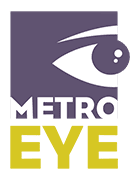Vision Exam Frequently Asked Questions
Can I opt out of the ‘Exam Test Package’ if I only want what my insurance covers?
No. Although a vision exam allows for an overview of your vision and basic ocular health it is not in the best interest of our patient’s vision or ocular health to not provide the best care possible.
Why doesn’t insurance cover the additional diagnostic tests that Metro Eye performs?
Insurance companies cover only routine services. These routine services only allow for enough testing to write a basic glasses prescription for your right eye and your left eye as separate units and does not consider how your prescription is affected by the ability or inability of your eyes to work together to provide efficient/comfortable binocular vision.
These diagnostic tests are categorized by insurance companies to be outside of the scope of their coverage and no reimbursement is provided for the higher level of care you receive.
In previous years I paid a fee for Retinal Screening Photography, will I incur a fee for retinal screening photography in addition to the ‘Exam Test Package’?
No. Retinal Screening Photos are part of the package.
What are the additional diagnostic tests that are included in the ‘Exam Testing Package’?
Performed on all patients*:
- Retinal Screening Photos
- Expanded Oculomotor Assessment
- Routine Topography
- Accommodative testing and near vision evaluation
- Screening for Dry Eye and Meibomian Gland Dysfunction with initiation of entry level treatment
Performed as needed:
- Axial Length measurements
- Neurolens testing
- Brief evaluation of known ocular disease(s) to determine if stable or if an additional medical exam should be scheduled.
- Cycloplegic Refraction
- Pachymetry to facilitate discussion regarding Lasik or other refractive surgery options.
What is the difference between a New Patient and an Established Patient?
New Patients are defined by insurers, including Medicare, as a patient who has not received any professional services from any physician in the same practice within the past three years.
If you have always done these tests, why have I not been charged in the past?
The simple answer is that we continue to invest in technology and the education of our doctors and staff to improve your quality of care. However, insurance companies have not raised our reimbursement rates for vision exams in the past 17 years. So, Metro Eye was faced with three options:
- Discontinue accepting insurance for vision exams.
- Provide a lower level of care by performing only the tests which an insurance company, not your doctor, feel are adequate.
- Continue to provide a comprehensive evaluation of your visual system and screen for ocular disease with an associated fee which is not submittable to insurance.
* In certain uncommon situations, a test may not be feasible due to factors such as patient compliance, the inability to respond to questions, or difficulties in being positioned at the diagnostic instrument.

